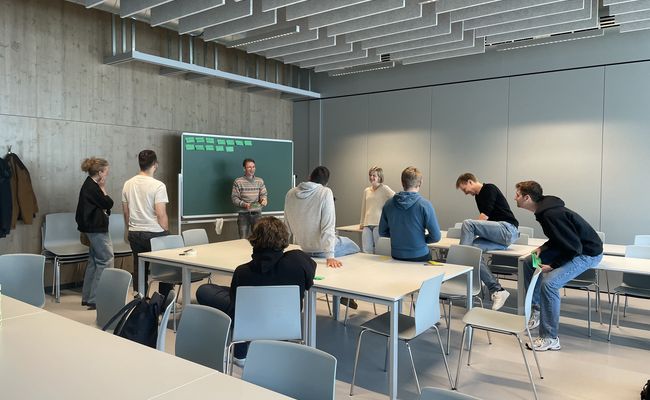We support interdisciplinary collaboration and cross-disciplinary learning in order to prepare students for tomorrow's complex challenges.
In keeping with LIFT_C's objectives, our teaching activities are based on the following core principles:
We are passionate about making an impact. We are committed to helping students experience and learn ways to have impact and create it in a meaningful and positive way.
We aspire to provide high-quality education and prepare students to be ready for – and embrace - transformative change.
We celebrate diversity by creating an environment where everyone's voice is heard, valued, respected, and appreciated.
We ardently advocate sustainable practices to create a future worth living in.
We incorporate social responsibility within our courses and programs to foster and encourage positive social change.
The following three courses reflect our educational philosophy:
L.C.R: Learning. Commitment. Responsibility.
LIFT_C is based on the idea that the growing social challenges require universities to become more involved in the community; in this context, we use the term "third mission". Actively and empathically engaging civil society is essential in order to shape social transformation processes. Experience-based teaching, such as L.C.R., can play a part in these processes.
L.C.R. - short for “Learning. Commitment. Responsibility.” is a field-oriented educational method actively involving students at social institutions, or in projects of their own, and giving them the opportunity to earn ECTS credits for their efforts. The basis for the course is a pedagogical concept of experience-based "service learning" aimed at using one's personal skills and/or professional interests to benefit the community and, upon personal reflection, acquire additional key skills to support personal and professional growth. Following an introductory course, students select a social organization where they would like to become involved. After completing the volunteering hours (of 40, 60 or 80 hours), students reflect on the experience(s) in writing and during a personal interview. Upon request, students can receive a certificate of achievement.
Medicine X AI
Launched jointly with the Art & Science department, the interdisciplinary course "AI in Medicine" brings students in the fields of medicine, AI, and law together. Over the course of five days, experts at the JKU and KUK - along with international guest speakers - provide insight into current areas of research and mentor students in working on their projects. They explore intriguing questions at the crossroads of artificial intelligence and medicine together, such as "What can AI do for medicine? What kind of legal/social/ethical aspects must be taken into account? What implications will AI have in terms of making medical decisions?" The objective is to identify a common language and demonstrate and explore the potential of interdisciplinary collaboration.
UpdateSocial Course
We have come to realize that students across all majors are very interested in being socially involved, having a tangible social impact, and acquiring hands-on. real-world experience. Open Social Innovation formats support experiential learning as part of a dynamic environment where students can apply what they have learned in the classroom and hone their skills to address real-life social challenges.
UpdateSocial, opens an external URL in a new window was launched in April 2023 in the form of an intensive "48-Hour Idea Workshop.". During one inspiring weekend, academia (JKU, UASs), social institutions, the public sector, and civil society worked closely together with 55 experts in various socially critical fields and 200 participants from the broader community. Following a format similar to a hackathon, participants worked collectively on a total of 38 innovative solution concepts to address the pressing social challenges of our time. A 5-month implementation program followed the Ideas Workshop, during which 24 interdisciplinary teams from the Ideas Workshop were given focused support to put their future-oriented ideas into practice by means of workshops, individual feedback sessions, networking opportunities, community events, and start-up grants.
Students earned ECTS credits for taking part in the Ideas Workshop and implementing the program. Students acquired diverse perspectives and hands-on experience while working on user-centered solutions to address real-world social problems as well as by actively involving various parties, including researchers, external partners, industry experts, stakeholders, and interested, innovative members of the public during the entire process. By working on real-impact projects, the students learned how to address complex challenges, negotiate opposing opinions, and apply theoretical concepts to practical context. One student, for example, commented: "I had an opportunity to hone my personal and professional skills and learn how to start with an idea to eventually create a concept and a prototype." The students' involvement in UpdateSocial was a unique opportunity to acquire a deeper understanding of the broader social and ethical implications their work had, as well as being able to influence social change themselves. One student remarked: "The experts' experience was an inspiration in terms of thinking about completely different career prospects."
See: UpdateSocial, opens in new window to learn more.
As part of the JKU Community Calls, opens in new window, there will be an UpdateSocial course offered during the 2024 Summer Semester.
 Go to JKU Homepage
Go to JKU Homepage




